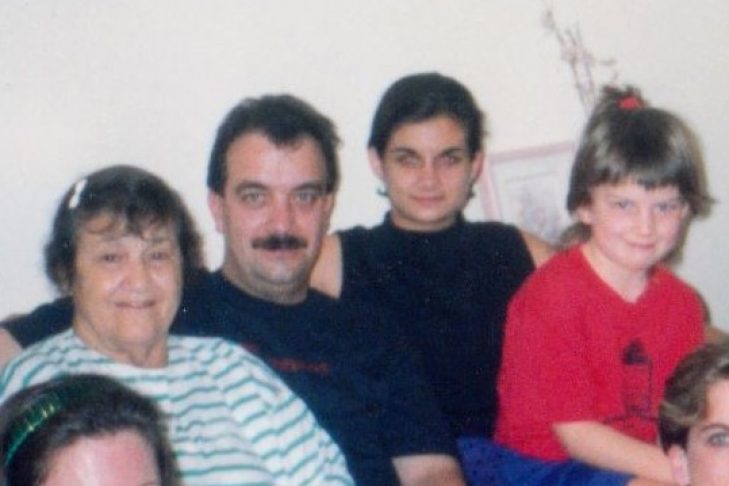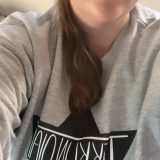Some fun information I learned when the amazing organizer Stephanie Berkowitz emailed the Shavuot sermon slammers: When the farmer is presenting the first fruits to the priest on Shavuot, he has to recite a pretty familiar refrain that seeks to frame our historical status as slaves as the backdrop for the joy of that moment. Because, let’s be honest, we can’t go long without reminding everyone about Pharaoh and Egypt.
Anyway, that farmer had to start with the oft-repeated, “My father was a wandering Aramean.”
When I saw that while I was feverishly trying to figure out what the hell to say in this very moment, I knew the universe was speaking to me with those few words.
You see, my offering to you has no fruit attached, but it does have some stories about my father, the pretty stable Armenian.
There’s one photo of my father when he was very small in Tehran with a goat, where he’s got it in sort of a half hug, half stranglehold that, to me, exemplifies the image I have of my Iranian heritage. For most of my life, the relationship I’ve had to this part of my identity has been faint at best, mostly tied to food, of course, infrequent visits with my grandmother in Orlando, eating rice on Passover, some Farsi phrases and my dad’s deep tan in the summer.
My father is a Jew by choice, and my mother the daughter of Holocaust survivors; in retrospect, when I think about it, our Jewish-ness felt very squarely Ashkenazi. And while sabzi choresh, dolma and tah-dig are prominent foods in my childhood memory, Jewish holidays were tied to matzah ball soup or potato latkes and the other traditionally European fare.
It wasn’t until recently when, bluntly, I started looking at my parents’ mortality in the face when my father had knee surgery last summer. I really started to ask questions of myself about how I inhabit this Iranian part of me, of my father and my beautiful, tiny, now-passed Grandma Julie. I’ve built so much of my identity around whiteness—I have explored it through literature, in academic settings, in Jewish social justice spaces and in my own writing. I have spent most of my life understanding my role in a lily white identity because, I mean, look at me.
So to explore something beyond whiteness has felt scary. Because what does it mean to complicate my identity? It means the bedrock of what I thought I understood is pulled out from under me a little bit, or maybe it’s just a little more uneven than I thought. Because am I trying to shirk my clear white privilege if I look at my heritage as more than a “this or that” set up?
The other impetus behind this new exploration is that I have been so privileged to be in these incredible spaces with black and indigenous Jews, Latinx Jews, Asian Jews, Jews of color, Sephardi and Mizrahi Jews, who claim their identity in this full and joyful and beautiful way. They’ve been doing this for generations, but my exposure to them has been a recent one. And I started to see their celebrations and identify with them, because their stories about their grandmothers’ beautiful cooking or language or stories of home mirrored my own. Because the racial profiling they and their family members have experienced reminds me of some my father experienced in airports post-9/11 because his passport said he was born in Iran.
And it was through these gracious souls that the world started to open up a little, over wine in Tennessee and breakfast in Dorchester and phone calls across state lines. That, with some serious nudging from friends, gave me permission to ask my dad about being Iranian, about what it means to him and about why we maybe didn’t embrace it so fully.
So over Thai food in Newton Centre one day, my dad and I had a more in-depth conversation about identity than we ever had before. We talked about assimilation as protection from taunting children, about family members and friends I’d never heard of before, about what it means to him to be Iranian and how it may also be more than just identity work because of the complexity of family. And we agreed to look more into our ancestry, to look up some old relatives and to cook our way through some recipes together. My cousins, raised by my grandmother, and I are talking more about planning a trip to Tehran someday. Fingers crossed.
And I’m still working on my own internal stuff. My wandering identity, and how it relates to my father and my grandmother and our lineage from a land far away, a land sometimes vilified by politicians and sometimes Jewish community members. And I’m un-peeling the layers of complex questions this is all raising for me.
But the thing I know is that the question brought me closer to my father, the gentle, funny, political, musical, passionate, Jewish, wandering Armenian.
This post has been contributed by a third party. The opinions, facts and any media content are presented solely by the author, and JewishBoston assumes no responsibility for them. Want to add your voice to the conversation? Publish your own post here. MORE



